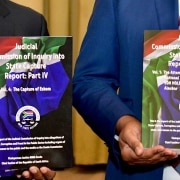|
Getting your Trinity Audio player ready...
|
Of the 824 companies interviewed by Control Risks for its annual survey, 30% named corrupt competitors as a major cost to international business. And 41% of respondents said the perceived risk of corruption was the main reason they had shut a deal down.
The global business risk consultancy released its 2015/2016 International Business Attitudes to Corruption survey in mid-October.
The report comes as international enforcement of anti-corruption laws intensify, thanks mainly to efforts in the US and UK. Both countries have achieved recent success in imposing sanctions on companies that were found to have paid bribes. In the UK’s case its Serious Fraud Office secured a number of convictions, while the US was able to impose a fine of over $700-million on an FCPA transgressor, among other achievements.
This increased vigilance from regulators means that companies have to ensure robustness in their compliance programmes. But, warned the company’s CEO Richard Fenning, overreliance on compliance is dangerous as it can lead to a false sense of security. “There is no point admiring the instruments on your shiny compliance dashboard if you’re not watching the road ahead – and not checking your blind spots.”
Control Risks commissioned an international survey of 638 companies operating around the world and asked them if they were ready for the challenges that they face in today’s compliance environment, and to be called to account.
Corruption still a major challenge for the honest
Control Risks found that corruption remains a major cost for honest companies: 30% of respondents said they believe they have lost deals in situations where there was strong circumstantial evidence of bribery by the successful competitor.
This is more prevalent among companies based in non-Western countries and of the respondents headquartered in South Africa, 35% indicated this was the case. Only results for Middle Eastern respondents (mostly based in the Emirates) were lower than the global average, the report noted.
Business challenges are exacerbated by the so-called facilitation payment situation which, Control Risks said, is commonplace in emerging markets. These small bribes, which are used to speed routine governmental transactions, are typically accompanied by an implicit threat: “You need to pay or your business will suffer.”
The feeling among 19% of respondents is that refusal to pay imposes “major delays and significant costs”, and 3% said refusal causes their businesses to “grind to a halt”. On the other hand, 38% of respondents said that they had never been asked, but this is not likely to be true for companies operating in areas such as Indonesia, India and Nigeria.
South Africa is named as one of the hotspots for experience of this activity, with 36% saying that refusal to pay a facilitation payment leads to major costs and delays, and 10% saying their businesses would stall without such payments. However, Control Risks clarified, respondents may have been thinking of their international operations elsewhere in sub-Saharan Africa, not necessarily their home country.
But corruption is not just an annoyance, it’s a risk to investment – 30% of respondents say they have decided not to conduct business in a particular country because of the perceived risk of corruption. In South Africa, 55% of companies stated that they avoid certain countries for that reason. Although corruption does not deter investors completely, many good companies stay away because of it.
Laws doing their job
Respondents, especially those based in tougher markets, felt that international anti-corruption laws were improving business environments worldwide – 81% of respondents agreed, with 64% saying that such laws deter corrupt competitors, and 55% saying they make it easier for good companies to operate in high-risk markets.
For many international companies, compliance with anti-corruption laws has become a competitive advantage, the survey found. But companies still need to be cautious – the gap between the perceived protection a compliance programme brings and its actual mitigating effect is the biggest point of weakness for companies operating in high-risk markets.
When it comes to vetting third parties, only 58% of respondents said they have a procedure for integrity due diligence assessments of third parties and only 43% have third-party audit rights.
The survey revealed that 51% of respondents have conducted no internal corruption investigations in the past two years. This calls into question the effectiveness of internal audits, highlights the danger of waiting passively for a whistle to be blown, and perhaps suggests a culture of complacency in some organisations.
Another factor the report emphasised was the need to set the right incentives for individuals. Respondents cited the fear of negative consequences as the penalty used most commonly to deter corrupt behaviour.
The survey asked respondents to rank the top three deterrents to corrupt business behaviour. Three out of the four most popular choices involved an element of fear: of prosecution, of internal monitoring, and of company penalties, such as demotion or dismissal. Lower down on the list comes those company performance criteria that emphasise ethical behaviour together with financial targets – and as long as financial targets trump anti-corruption targets, said Control Risks, shortcuts will be found.








